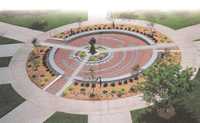
Willa Wolfe Cottrell
is honored with a Brick from Carol Konek.
Willa was, first of all, the darling girl of Willis and Lula Norman Wolfe, their youngest child, her birth healing her parents' thwarted dreams that had, for a time, seemed unrealizable, after their loss of their baby Joy in the flu epidemic of 1918. Following the ghostly presence of Joy and the lively brilliance of her older brothers, Leonard, Norman and Benny, Willa learned to mediate, to charm, to coax strong personalities into community. She forged and nurtured connections between people. She emulated the charm of her mother and charisma of her father. She learned how to bring people together and how to inspire harmony and understanding. Everyone adored and respected her.
Growing up, Willa always demonstrated industry and respect, redefining girlhood as she waited on the gas pumps and joked with farmers and mechanics. She was gracious and ladylike, sophisticated and unconventional, rebel and nice girl, independent thinker with impeccable taste and warm-hearted good manners. The kid sister of a small town where everyone noticed every act and gesture if you were, as she was, their own. She became a good businessperson waiting on customers and servicing cars at the Wolfe Motor Company, revising contemporary small-town ideals of proper girlhood. Her father, Willis, told her, as he was to later tell me, "Wolfe women aren't like other women." That meant we could do women's work and men's work, that we could earn the respect of farmers, ranchers, and local merchants.
Willa was beautiful and gracious, practical and captivating. She was my guide into womanhood. Seven years older than I, she gave me her outgrown clothes and discarded dolls. She showed me how to tap and twirl. I envied her freckles and braces, and later, her clothes and boyfriends The summer before I entered the eighth grade in Meade, she invited me to spend a weekend with her at Corbin Hall at Kansas University. She gave me my first lipstick Tangee, so pale my parents wouldn't notice I was wearing it and my first cologne, Evening in Paris, more subtle and less dangerous than her Tweed which lured boys who clustered around her, buying her flowers and records and candy. I went with Willa and her roommates to see the film "Gilda." Afterward, we went to the Jayhawk for a Coke. That day I felt no one could possibly mistake me for a twelve-year old.
When Willa married Dick Cottrell, they defined sophistication for me. I loved their baby Marc, pretending he was my own baby when I baby-sat while they went to Colorado or Vegas. When she became a landman, uncovering land titles and oil and mineral leases in court houses all over Kansas and Oklahoma, working with Dick and later, their sons, Marc and Kirk, she also compiled genealogical information. As she and her husband and sons sought wealth beneath the hills and fields, she sought family history to connect all of us to our forebears and to the lands they had crossed and farmed as they brought us to this wonderful place.
Multiple Myeloma bent her once graceful form, but not her gallant spirit. She kept us all encouraged and entertained as she defied the indignity and inevitability of a terrible death. We followed her example, crying alone and laughing together. I remember her telling me after her fatal diagnosis, "I've never been happier. I have a wonderful life." Hers was a tragic death in that she faced it by more intently than ever, embracing life.
Every time I realize her death, I am surprised. In my mind's eye, and in my heart's memory, she is listening, laughing, intense, fully present to those to whom she gives herself.
I see her tap dancing on the sidewalk at Nana's house, her hair flying, her freckles glowing, her braces flashing in the sparks of sun shooting through the dappled shade.
I see her ethereal in white organza before the glittering candelabra in Nana's living room, saying, "I do," to a frightened boy who will break her heart and mend it before they finally part.
I see her huge with child, wearing a turquoise velvet dress with a beaded pearl neckline. I, too, will wear this dress when I am huge with dreaming Jill.
I see her scooping wheat, the year of the bumper crop when the elevators were full, working like a man, laughing like a girl.
I see her at the grill, searing huge T-bone steaks, laughing, teasing Dick, looking away, looking up, sexy, funny, charming.
I see her lighting candles. I see her striking a match under the coffee table, lighting up, talking and listening to Eileen, Janice, Everta.
I see her dancing with her brother Benny, having a ball, being the life of the party.
I see her in photographs, an impish little girl, a glamorous woman, an adoring mother, a beloved wife, a loyal sister, a cherished friend. Daughter, sister, aunt, wife, mother. Our darling girl, Willa.
Submitted by Carol Wolfe Konek
October 28, 1998










